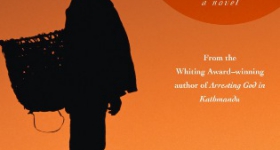On 9/11, within minutes of the attacks, four men chased after a Sikh man who had escaped from the towers and now had to escape once more for his life...[;] in Los Angeles, on September 13, 2001, an Iranian woman was punched in the eye by another woman who wanted to register her displeasure at those who look like terrorists; on September 15, 2001, in Tulsa, Oklahoma, when Kimberly Lowe, a Creek Native American, stopped her car to confront a group of white males who had yelled, ‘‘Go back to your own country,’’ they pinned her down and drove over her till she died.
-Vijay Prashad, How Hindus Became Jews: American Racism after 9/11
This was the environment in which Mohsin Hamid's novel, The Reluctant Fundamentalist, was released. The narrator, Changez, is a New York investment banker who, post-9/11, becomes disillusioned with his life and returns to Pakistan. Yet strangely enough, his leaving has little to do with the aftermath described above.
I found The Reluctant Fundamentalist to be beautifully written and well-paced, with particularly interesting descriptions of Old Anarkali. However, none of the characters in this book felt real to me. They seemed more symbols than people, with story arcs that made intellectual sense, but had little emotional resonance. And so I had a difficult time thinking of it as fiction. It read more like a flawed, though compelling, allegorical essay challenging post-9/11 America, in part by contrasting it with an idealized version of pre-9/11 America.
Pre-9/11, Changez's life follows the propaganda script for the American dream. He comes from a cash-strapped, downwardly mobile family in Pakistan, and attends Princeton on scholarships and financial aid, at times working three jobs to make ends meet. (While maintaining a straight-A average and being on Princeton's varsity soccer team. This, like some other things in this book, seems to needlessly stretch the boundaries of believability.) Upon graduation, he joins a prestigious and powerful investment banking boutique, Underwood Samson, and becomes its rising star, and gains a beautiful girlfriend, Erica, who serves as his entree into upper class New York society.
In this world, Changez's Pakistani heritage poses no hindrance. During his training period at Underwood Samson, the vice president says to the new hires: "We’re a meritocracy. We believe in being the best... If you do well, you’ll be rewarded. If you don’t, you’ll be out the door. It’s that simple." And it really is that simple. Not only are there no systemic biases that females, people of color, and recent immigrants have to overcome; Changez's identity as a non-white immigrant serves as his greatest asset. Changez is hired and mentored by Jim, his managing director at Underwood Samson, because Jim claims to relate to Changez's outsider status. Changez repeatedly states that his foreignness gives him an advantage in social and business interactions.
After 9/11, things begin to change, though slowly. Changez hears of Pakistanis being beaten, of the FBI raiding mosques, of Muslim men disappearing, but remains pragmatic and unmoved. They were mainly rumors, he thinks, and his upper class status would prevent such things from happening to him. He accompanies his girlfriend Erica to fundraisers for the victims of 9/11 and reflects on how comfortable he feels in the society Erica introduces him to, as if he belongs there. For a time, Changez remains the ideal of the assimilated immigrant -- inhabiting the world of white, wealthy Americans, rather than that of other Muslim and Pakistani Americans, who are all portrayed as lower class and having little in common with him.
It's the US bombing of Afghanistan that makes Changez break this mold. He sees the bombing on television and is shocked, and spends a sleepless night trembling with fury. But the cause doesn't seem to be a moral outrage at the loss of civilian life, or at the hypocrisy of America's foreign policy. It seems to be that "Afghanistan was Pakistan’s neighbor, our friend, and a fellow Muslim nation besides" -- a very personal sense of betrayal.
Changez's disillusionment with America, his sense of betrayal, can be tracked by both the growth of his beard and the elaborateness of his Middle Ages/modern world metaphors. Shortly after 9/11, Changez looks at the skyscrapers of New York and wonders "what manner of host would sally forth from so grand a castle." He later states: "The mighty host I had expected of your country was duly raised and dispatched -- but homeward, towards my family in Pakistan." But the crucial turning point is Juan Batista, the owner of a publishing company that his firm is valuating in Chile, whose words lead Changez to quit his job and return to Pakistan.
Juan Batista asks Changez if he has heard of janissaries, and Changez says he hasn't.
“They were Christian boys,” he [Juan Batista] explained, “captured by the Ottomans and trained to be soldiers in a Muslim army, at that time the greatest army in the world. They were ferocious and utterly loyal: they had fought to erase their own civilizations, so they had nothing else to turn to.”
He tipped the ash of his cigarette onto a plate. “How old were you when you went to America?” he asked. “I went for college,” I said. “I was eighteen.” “Ah, much older,” he said. “The janissaries were always taken in childhood. It would have been far more difficult to devote themselves to their adopted empire, you see, if they had memories they could not forget.”
This metaphor of being a janissary -- and by extension, that of countries being feudal kingdoms engaged in a clash of civilizations -- is one of the underlying themes of the book. And, although it is undeniably startling and entertaining, it contains little nuance. Muslim Americans, as well as most other American minorities, are limited to two roles: victimized serfs or brainwashed native informants (the Janissary which Changez barely escapes the danger of being). The complexities of international politics, as most recently seen in the uprisings in Northern Africa and Western Asia, are also ignored.
Another underlying theme of this book, with many of the same drawbacks, is that of Erica (Am-Erica) representing the America that Changez once loved, and Changez being the agent of change (Changez/changes) that she, and America, can no longer handle.
Pre-9/11, Erica glows with health and vitality, effortlessly attracting people to her orbit. Post-9/11, she becomes increasingly disturbed and distant, lost in remembrances of her dead boyfriend. Unable to deal with the memories and insecurities that 9/11 has brought to the forefront of her mind, she becomes institutionalized. The nurses discourage Changez from visiting, claiming that he is too real for her to deal with. Soon after, Erica commits suicide.
Changez repeatedly makes the connection between Erica's state of mind and that of America, stating:
it seemed to me that America, too, was increasingly giving itself over to a dangerous nostalgia at that time... I had always thought of America as a nation that looked forward; for the first time I was struck by its determination to look back... What your fellow countrymen longed for was unclear to me -- a time of unquestioned dominance? of safety? of moral certainty? I did not know -- but that they were scrambling to don the costumes of another era was apparent. I felt treacherous for wondering whether that era was fictitious...
It's interesting how the myth of American exceptionalism is turned on its head here. This America is not a heroic savior of the oppressed; this America is increasingly lost in its own psychosis and needs to be saved from itself. However, the simplistic binary that underlies the myth remains largely unchallenged. The only thing really questioned is America's continued role in the script as the savior and not the victim (and victimizer). [1]
In the world of The Reluctant Fundamentalist and its extended metaphors, America is losing its power. But the causes, surprisingly, are not a foreign policy focused on securing oil rather than human rights [2], or a neoliberalism based on unsound economic fundamentals [3], or the continued exploitation of its disenfranchised minorities and the non-Western world.
Per the novel, America is losing its power mainly because it keeps looking backwards and giving itself over to a dangerous nostalgia. One of the consequences of this dangerous nostalgia is that it has begun to attack its loyal vassals. And as critiques of American exceptionalism and explorations of immigrant and Muslim identities post-9/11 go, this seems to be a rather limited and limiting approach to take.
One last note. While this novel shows little of the aftermath of 9/11, of the backlash against Muslims and continuing fears of the Muslim peril, it also seems to depend on these things to grant it immediacy.
The novel opens in Lahore, with Changez and an American going to an outdoor cafe, where Changez tells his story. The American never speaks, functioning primarily as the means by which Changez's story is narrated directly to the reader (we become the wary, out of place, possibly gun-strapping "you" that Changez is addressing). Therefore, the cause of much of the tension in this book, is the question of what Changez's motives are, whether he is a terrorist or not, and what Changez will do to the American once his story is over.
If that question doesn't seem compelling to the readers, if the readers don't identify themselves with the American, the novel loses some of its force and immediacy. In this way, and in consideration of some of the responses it has evoked, I've begun to think of it as the literary equivalent of the Rorschach inkblot. [4]
------------------
[1] In other words, the myth of America -- rich, urban, sophisticated, predominantly white, embodiment of modernity -- is still conflated with the reality of it, and contrasted with a third world that is taken to be its opposite. In this process, the lives and experiences of disenfranchised American minorities (many of whom have little reason to be nostalgic of a pre-Civil Rights era), and the similarities between America and third world countries, among many other things, are rendered invisible.
[2] Though one of the consequences of this does serve as an impetus for change for Changez.
[3] Changez characterizes these practices as promoting efficiency and "a systematic pragmatism -- call it professionalism -- that underpins your country's success in so many fields." What is questioned, however, is America's continuing capability to keep championing such practices. When rationalizing why it is necessary to shred salaries and pensions and jobs in order to increase a corporation's profits, Changez's boss Jim says, "Things always change. Most people don't recognize that... They try to resist change. Power comes from becoming change." The change that America can no longer deal with, that Changez is the literal embodiment of.
[4] Why is Changez perceived as threatening, and not the secretive, military trained American who is possibly carrying a weapon in a peaceful civilian setting? Why is Changez's continuous narration perceived as menacing (rather than nervous, the words of a naive and self-absorbed Sheherazade) and not the silence of his listener?










Comments